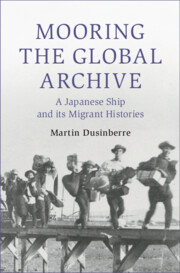'Martin Dusinberre challenges us to engage critically with the idea of a ‘global archive’ in writing global history in this fascinating study of the ‘Yamashiro-maru’, a Japanese steamship which transported Japanese migrants in the Pacific Ocean. This is an innovative and thought-provoking book, sensitively written.'
Naoko Shimazu - Yale-NUS College and Asia Research Institute, National University of Singapore
'In this engaging study, Martin Dusinberre situates migrant Japanese plantation workers, sex workers, and others in relation to imperialism, extractive capitalism, and formations of indigeneity in the Pacific. Challenging the epistemologies of the modern discipline of history, Dusinberre demonstrates how scholars might listen for other voices when assembling their archives.'
David Ambaras - Professor of History, North Carolina State University
‘… those who embark on the reading journey will gain a variety of insights, inspiration and entertainment from this book.’
Susanne Quitmann
Source: Schweizerische Zeitschrift für Geschichte
‘I have not encountered any other work like it. The book is both a study of a ship and its voyages and a close account of Dusinberre’s own journey through a wide variety of archival sites, as he painstakingly reconstructs the lives and experiences of the migrants and other people connected to the Yamashiromaru both on board and ashore. The sources that he uses range from letters, diaries, and government documents to gravestones, photographs, maps, and paintings. The author makes a case for self-reflective and imaginative historical research and writing, urging scholars to pay close attention to colonial contexts and Indigenous perspectives and to 'the brackish spaces … between physical and digitized archives' that challenge accepted methodologies and interpretations.’
Steven J. Ericson
Source: American Historical Review

